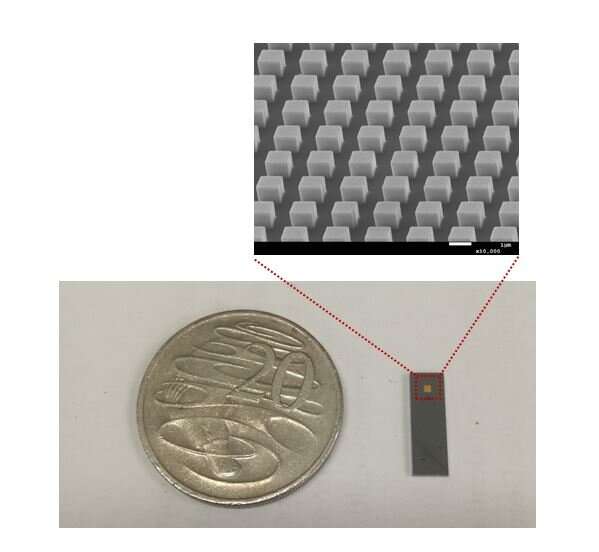Early warning for immune system overreaction in cancer treatment and COVID–19

An "immuno-storm chip" developed by University of Queensland researchers could diagnose cancer and COVID-19 patients at risk of a potentially lethal reaction.
The device was invented at UQ's Australian Institute for Bioengineering and Nanotechnology (AIBN) by Professor Matt Trau, Dr. Alain Wuethrich and Junrong Li.
Professor Trau said the chip is designed to determine which patients are at risk of a potentially lethal "cytokine storm," an uncontrolled immune response which damages the body's tissues.
"Having this early stage diagnostic could help healthcare workers triage and closely monitor high-risk patients and begin treatment much earlier," Professor Trau said.
"Whether in a cancer treatment setting or when monitoring infectious diseases such as acute COVID-19, long-haul COVID-19 and sepsis, the chip could provide critical medical information that guides important clinical decisions."
Cytokines are small proteins that act as messengers between cells in the immune system.
"Cytokines play a critical role in triggering inflammation by stimulating the movement of immune cells toward sites of injury or infection," Professor Trau said.
"When this becomes uncontrolled and causes damage, more cytokines are produced and it becomes a vicious cycle, called a 'cytokine storm.'"
"About 80 percent of cancer patients who undergo cutting-edge immune therapy are likely to have an adverse response, such as a cytokine storm.
"For reasons we don't totally understand—whether it's due to genetics or immune history—around one percent of COVID-19 patients get a crazy cytokine storm."
"It now seems clear that many COVID-19 deaths are caused by this mechanism, but it is very difficult to predict who will develop this response."
"Such adverse immune events are now also becoming associated with COVID-19 long-haul symptoms."
The researchers said their chip detects a faint but distinctive pattern of cytokines on a nanoscale platform with a small blood sample several days before the full-blown 'storm."
They created a tiny array of gold pillars and attached antibodies that would stick to specific cytokines present in a blood sample as small as a single drop.
Gold-silver 'nanotag' particles emit bright light when they come into contact with single captured cytokine molecules, allowing minute levels to be detected by conventional and inexpensive optical imaging equipment.
The researchers were able to test the device via a collaboration with Dr. Andreas Behren at the Olivia Newton John Cancer Centre in Melbourne, who also provided clinical samples.
Professor Trau said the chip's small size meant it could eventually be made relatively portable.
"The immuno–storm chip would allow hospitals to focus resources on patients at high-risk of a 'cytokine storm," while low-risk patients could potentially be monitored from home.
"Critically, it could inform doctors to begin or to ease treatments by accurately monitoring the patient's immune response, fine-tuning a patient's therapy to alleviate their specific excessive immune system response."
Professor Trau said the successful demonstration of the immune-storm chip technology opened up the possibility and partnering with other organizations to progress the chip further into the clinic.
The findings have been published in the journal Nature Communications.
Professor Trau is part of AIBN's Precision Nanomedicine research, which is revolutionizing the way we understand, diagnose and treat disease by designing technologies that interact with human cells and pathogens at the nanoscale—thousands of times smaller than the width of a human hair.
More information: A digital single-molecule nanopillar SERS platform for predicting and monitoring immune toxicities in immunotherapy. Nat Commun 12, 1087 (2021). doi.org/10.1038/s41467-021-21431-w




















